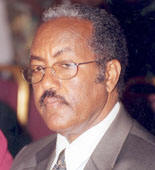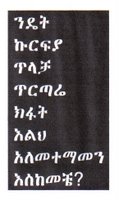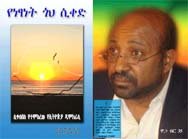We have argued in several postings in this blog that the rub of Ethiopian democracy is not whether the opposition was prepared to lead in 2005 or if it offered attainable proposals to move Ethiopia forward. Democracy asks a simple question to those who claim the leadership mantle: did you legitimately obtain the consent of the governed to rule over them? We have argued the unprecedented number of votes for opposition candidates amid widespread electoral fraud, uncured by the courts, coupled with governmental crackdown that led to wanton loss of life is sufficient to answer the basic democracy question in an unqualified negative.
Having reconsolidated its federal and regional powers at unprecedented levels, the EPRDF has directed its vision to the next election cycle. Whether the governed accept it or not, the EPRDF has convinced itself it has received a constitutional mandate to rule, at least until May 2010. Mr. Bereket Simon’s interview with Addis Fortune Managing Editor Tamrat G. Giorgis is revealing: his party believes the May 2005 election was a “protest vote [against the EPRDF];” an act to be remedied through active “engagement politics.” The irony of the EPRDF’s all-out campaign to win the hearts and minds of Ethiopian voters by May 2010 is not lost on us—the ruling party is actively engaged in a post-electoral campaign to retroactively win a fight it lost. Pungent to our sense of reason is the EPRDF’s newfound determination to begin “engaging” the people of Ethiopia fifteen years into its rule.
The EPRDF’s new engagement venture will ultimately fall on deaf ears simply because it seeks to indoctrinate the governed—we take the EPRDF at its own words: in Mr. Bereket’s view, his party, “which during the liberation movement was capable of building a very committed army out of nothing,” has succeeded in recruiting "3 million" new members since the election. Non-sequitur claims aside, Mr. Bereket’s exultations of quadrupled recruitment in a non-election year not only shows the EPRDF (and unfortunately, Ethiopian) proclivity to exaggerate but also lays out his party’s blueprint for the next three-and-a-half years. Our issue here is not the numerical improbability of Mr. Bereket’s claim but one of incredulity at the TPLF’s unwavering thirty-year precept for seizing and retaining power.
In our humble view, the opposition seems fractured; it is reactive rather than proactive; its leaders are divided—literally and figuratively—its most capable leaders are behind bars fighting for their lives; others are in parliament, caught in lethargic legislative quagmire and incapable to mount intelligible opposition of any kind, unable to numerically effectuate meaningful change, or in exile, leading efforts to convince U.S. and European lawmakers to pass sanctions on Ethiopia whose effect on the lives of ordinary Ethiopians remain unclear (we essentially find it difficult to evaluate the impact of aid reduction and/or elimination on our people while sipping on Montague Street Frappuccinos) (we do, however, find U.S.-based advocacy on behalf of H.R. 5680 laudable). Possibly the most powerful political party to adorn the Ethiopian political landscape, the EPRDF has successfully created chaos among its dissidents by turning the very act of disagreement amongst those who oppose it a birthright to rule in perpetuity. It may be difficult for some to come to terms with these realities but the truth is better dealt with squarely rather than sequestered.
But those who oppose the EPRDF should never fear the lack of unity or disorder among the various opposition parties and its leaders. Its members and their followers should only fear absolutism within their ranks, lack of independent thought, and what Dr. Berhanu calls in YeneSanet Goh Siqed: Liqelebes Yetemokerew ye'Ityopya Democracy (Addis Voice's posting of the book's executive summary), “mehurawi senfina” (intellectual laziness). The EPRDF has maintained unity within its rank and file essentially because it has convinced its members and followers la luta continua—that they are engaged in revolutionary continuum against the ancien order. The opposition, politically diverse as it is and devoid of a unitary party dogma (of course, separatist movements including the OLF and ONLF do not figure in our definition of the "Ethiopian opposition") will be hard pressed to match the EPRDF’s alignment because, as Dr. Berhanu points out, the party arises in the rubric of a communist and guerilla order.
We believe the opposition is prepared to claim the democratic mantle precisely because of its background in alliance-formation between parties and individuals who hold relatively diametrically opposed views. Put differently and using the CUD and the UEDF as examples, what is relevant (and more instructive) to the parties is not what the final face of their coalitions resembled but the lessons they learned from the exercise of peacetime coalition building. We argue this enables the organizations and their leaders to ultimately become democratic governors who will be accountable to their people.
The EPRDF’s single-most failure is its inability to seize the Ethiopian spirit of faith, hope, perseverance, and yes, national unity beyond the frontiers of the Region of Tigray. Dr. Berhanu Nega’s executive summary of Goh effectively outlines the reasons for the ruling party’s utter failure in this regard. The Ethiopian government’s rule via dictat and command rather than consultation and negotiation with Ethiopians who hold diverse views about the political future of their country has turned most Ethiopians into cynics and complete disbelievers of all utterances made by the EPRDF leadership. As a result, the vast majority of Ethiopians, who are generally middle-of-the-road when it comes to affairs of policy have been forced to become intransigent and non-compromising toward the EPRDF. Most Ethiopians would be happy with any leadership they believe possesses Ethiopia’s (and only Ethiopia’s) interest at heart; an Ethiopia where its people are not ethnically and regionally pitted against each other and where its citizenry is empowered to believe in its ability to overcome any adversity together. Ethiopians are begging for leadership that understands that the Ethiopians are bound by common sets of traditions regardless of where they live, their ethnic background, and how much they earn.
 As far as the prisoners of conscious, had self-preservation motivated their actions they would have seen the outside gates of Kaliti months ago. All it would take is a concession to any of the countless pressures exerted by the government and various international actors. Their decision to turn down Ambassador Vicki Huddleston’s offer is admirable and tells us they have decided to stay the course. What the Kaliti 111 are hoping to preserve for the millions of Ethiopians who followed them to the polling stations in May 2005 is a resolution to refuse dictat and command; a collective decision to make the government’s prosecutors meet the outlandish burdens of proof they have set for themselves.
As far as the prisoners of conscious, had self-preservation motivated their actions they would have seen the outside gates of Kaliti months ago. All it would take is a concession to any of the countless pressures exerted by the government and various international actors. Their decision to turn down Ambassador Vicki Huddleston’s offer is admirable and tells us they have decided to stay the course. What the Kaliti 111 are hoping to preserve for the millions of Ethiopians who followed them to the polling stations in May 2005 is a resolution to refuse dictat and command; a collective decision to make the government’s prosecutors meet the outlandish burdens of proof they have set for themselves. Despite the EPRDF’s inflammatory charges of treason and insurrection and its ongoing antagonism toward its dissidents in Ethiopia and abroad, we believe a vast and silent majority of Ethiopians desire a peaceful political transition to take place in Ethiopia. Perhaps more than any time in their history, Ethiopians from all walks of life believe in democracy; they feel it in their bones, after all, “once people have the taste for freedom, once people see what it means to live without fear, to live in freedom, no government can impose its will on them.” (Dr. Berhanu Nega). Whatever happens in the next few months and years, we are convinced Ethiopia will ultimately devise a system where her children will not be carted away to faraway dreaded places of detention, where government is not feared, the rule of law is respected (one that limits the government’s powers), and where dissent and intellectual independence will not be considered treasonous. Dr. Berhanu Nega's executive summary of Yenestanet Goh gives us that hope.
Despite the EPRDF’s inflammatory charges of treason and insurrection and its ongoing antagonism toward its dissidents in Ethiopia and abroad, we believe a vast and silent majority of Ethiopians desire a peaceful political transition to take place in Ethiopia. Perhaps more than any time in their history, Ethiopians from all walks of life believe in democracy; they feel it in their bones, after all, “once people have the taste for freedom, once people see what it means to live without fear, to live in freedom, no government can impose its will on them.” (Dr. Berhanu Nega). Whatever happens in the next few months and years, we are convinced Ethiopia will ultimately devise a system where her children will not be carted away to faraway dreaded places of detention, where government is not feared, the rule of law is respected (one that limits the government’s powers), and where dissent and intellectual independence will not be considered treasonous. Dr. Berhanu Nega's executive summary of Yenestanet Goh gives us that hope.We wish to extend our gratitude to Seminawork for keeping the spirit of the Ethiopian private press alive. Ethio-Zagol deserves this year's Pulitzer Award for International Reporting.
Check Bati's Sweetethiopia for great poetry. And aydelehu ene is awsome.
Ethio-Mind's My Way or the Highway is brilliant.
Several Ethiopian churches accross the United States are raising funds for victims of the Dire Dawa floods. Please donate what you can.

